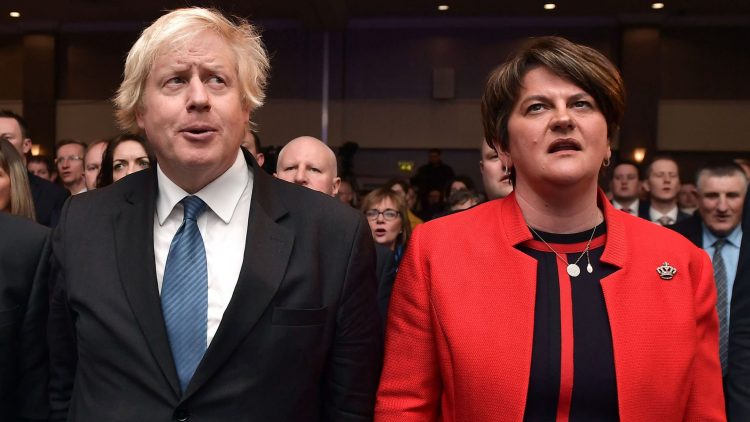The Good Friday 1998 Agreement required Irish officials to declare allegiance to nationalism, unionism or “something else”. Since then, power-sharing in Belfast has meant joint rule by “Sinn Fein” and a victorious Unionist party like the DUP, and since both parties are proudly sectarian, there is something special to be done to bring them closer. The two communities are not Catholic or Protestant.
The Good Friday agreement.
The Belfast Agreement is also known as the Good Friday Agreement because it was reached on 10 April 1998. It was an agreement between the British and Irish governments, and most of the political parties in Northern Ireland, on how Northern Ireland should be governed. The talks leading to the Agreement addressed issues that had caused conflict during previous decades. The aim was to establish a new, devolved government for Northern Ireland in which unionists and nationalists would share power.
On the constitutional question of whether Northern Ireland should remain in the UK or become part of a united Ireland, it was agreed that there would be no change without the consent of the majority. This is called the ‘principle of consent. The referendum could test the majority opinion in the future. The two main political parties to the Agreement were the Ulster Unionist Party (UUP), led by David Trimble and the Social Democratic and Labour Party (SDLP), led by John Hume. The two leaders jointly won the 1998 Nobel Peace Prize. Other parties involved in reaching an agreement included Sinn Féin, the Alliance Party and the Progressive Unionist Party. The Democratic Unionist Party (DUP), which later became the largest unionist party, did not support the Agreement.
Voters approved the Agreement across the island of Ireland in two referendums held on 22 May 1998. In Northern Ireland, voters were asked whether they supported the multi-party agreement in the 1998 Northern Ireland Good Friday Agreement referendum. In the Republic of Ireland, voters were asked whether they would allow the state to sign the Agreement and allow necessary constitutional changes (Nineteenth Amendment of the Constitution of Ireland) to facilitate it. The people of both jurisdictions needed to approve the Agreement to give effect to it. The British–Irish Agreement came into force on 2 December 1999.
Why its time for the Irish Unity?
According to one of the most recent opinion polls, the Irish nationalist party, Sinn Féin, has been polling higher than expected and has the most increased support it has ever seen in the Republic. However, Sinn Féin has only fielded 42 candidates, about half the number fielded by the two main parties, perhaps due to a previous loss of seats in a local election. It’s, therefore, unable to capitalise on the unexpected surge in support fully. The left-wing party was once considered the political arm of the Irish Republican Army (IRA), a paramilitary organisation to end British rule in Northern Ireland. Today, Sinn Féin fields candidates on both sides of the border. In Northern Ireland, the party represents a large portion of the nationalist, traditionally Catholic community and is part of the devolved government in Belfast. In the Republic of Ireland, where Sinn Féin is currently the third-largest party in the Irish parliament, the party has developed broadly centre-left policies such as anti-austerity measures and wealth taxes.
Northern Ireland’s former deputy first minister has urged the Irish government to prepare for a united Ireland. Sinn Féin’s Michelle O’Neill told Sky that nationalists “are closer than ever [to a united Ireland], and I think now is the time to plan”. She said the UK’s exit from the EU will lead to a referendum on the island of Ireland. Northern Ireland has been without a first or deputy first minister after the resignation of Paul Givan. The former Democratic Unionist Party (DUP) first minister Paul Givan resigned over his party’s opposition to the Northern Ireland Protocol. That move meant Ms O’Neill was removed from office as she joined the roles.
Many unionists, including DUP leader Sir Jeffrey Donaldson and his party, oppose protocol, saying it has placed a border between Northern Ireland and Great Britain in the Irish Sea. Ms O’Neill said that if Brexit “has taught us anything”, it is that the UK government does not prioritise people in Northern Ireland, “whether you be unionist, nationalist, or other”.
Can Sinn Féin and the DUP differences be bridged?
The two parties disagree about Brexit. In the 2016 EU Referendum campaign, the parties campaigned on opposite sides, with the DUP advocating for a Leave vote while Sinn Féin supported a Remain vote. The DUP announced its intention to campaign for a Leave vote following their disappointment with Prime Minister David Cameron’s attempts to renegotiate the UK’s position within the EU.
Sinn Féin believed that membership of the EU had benefitted the island of Ireland as a whole, especially in economic terms. Despite Sinn Féin’s history of Euroscepticism, such as campaigning for a No vote in the Irish Referendum on joining the European Economic Community in 1972. Some have argued that Brexit has exacerbated the divisions between the parties. The confusion over the Irish border and constitutional questions that have arisen following the result have not facilitated a good working relationship between the parties.
Northern Secretary Karen Bradley said she believes the differences between Sinn Féin and the DUP have narrowed and can be bridged. She is hopeful that an agreement on devolved government can be agreed upon between all five political parties in the North before 7 February. “The people of Northern Ireland voted for these politicians, and they must deliver,” she told RTE’s Morning Ireland. Mrs Bradley said politicians needed to reach an agreement to deliver public services. She added she would like the talks to achieve a positive conclusion before 7 February, the date she has to address the British parliament. “Things have to be done. The budget has to be agreed.” Mrs Bradley said Agreement had to be reached within weeks, not months. “I am focused on making a success of these talks. I sense that all the parties are willing to make this work.” The Northern secretary said that while she was a supporter of indigenous languages in the United Kingdom, the issue of an Irish language act would have to be dealt with by a devolved government in the North.
Northern Ireland has been without a fully functioning devolved government since last January when the late Martin McGuinness of Sinn Féin resigned as deputy first minister over the DUP’s handling of a botched green energy scheme and other matters. Other key stumbling blocks include differences around access to civil marriage for LGBT couples, an Irish language act, a Bill of rights and legacy inquest funding.
Conclusion.
The Good Friday Agreement led to the formation of the Northern Ireland Assembly, a devolved government based in Belfast that makes political decisions affecting the region. The Assembly must be made up of members from both the Unionist and Republican communities, both sides of the divide. To deal with the thorny issue of identity within the two communities in Northern Ireland, the Agreement includes the provision that anyone born in Northern Ireland can choose either Irish or British citizenship. This was to consider that a large portion of the population considered themselves Irish, while another considered themselves British.





























